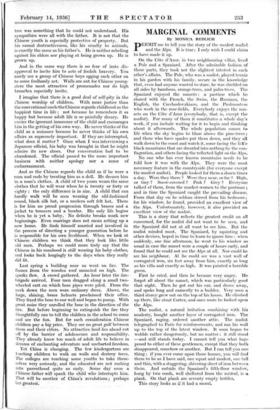MARGINAL COMMENTS
By MONICA REDLICH
PERMIT me to tell you the story of the modest nudist and the Alps. It is true; I only wish I could claim to have made it up.
On the ate d'Azur, in two neighbouring villas, lived a Pole and a Spaniard. After the admirable fashion of those 'parts, they took not the slightest interest in each other's affairs. The Pole, who was a nudist, played tennis in his garden with his family, secure in the knowledge that, even had anyone wanted to stare, he was shielded on all sides by bamboos, orange-trees, and palm-trees. The Spaniard enjoyed the sunsets : a pastime which he shared with the French, the Swiss, the Russians, the English, the Czechoslovakians, and the Piedmontcse who work in the rose-fields. Everybody enjoys the sun- sets on the °Ste d'Azur (everybody, that is, except the nudist). For many of them it constitutes a whole day's work, if you include waiting for it to begin and thinking about it afterwards. The whole population comes to life when the sky begins to blaze above the pine-trees ; and those who have spades put them down, and they all walk down to the coast and watch it, some facing the liit'e black mountains that are dwarfed into nothing by the con- flagration, and others facing the reflected light on the Alps.
No one who has ever known mountains needs to be told how it was with the Alps. They were the most necessary feature in the countryside (for everyone except the modest nudist). People looked for them a dozen times a day. Were they there ? Were they near, or far ? High, or tiny ? Snow-covered ? Pink ? Grey ? Everyone talked of them, from the market-women to the postman ; and in time the Spaniard caught the prevailing disease. From that day on he seldom stirred from his bedroom for his window, he found, provided an excellent view of the Alps. Unfortunately, however, it also provided an excellent view- of the nudist.
This is a story that reflects the greatest credit on all concerned, for the nudist did not want to be seen, and the Spaniard did not at all want to see him. But the nudist minded most. The Spaniard, by squinting and other devices, hoped in time to learn to ignore him :. when suddenly, one fine afternoon, he went to his window as usual in case the sunset were a couple of hours early, and found that he could not see the Alps at all. Nor could he see his neighbour. Al )he could see was a vast wall of corrugated iron, six feet away from him, exactly as long as his villa and exactly as high. It was painted a horrible green.
First he cried, and then he became very angry. He forgot all about the sunset, which was particularly good that night. Then he got out his car, and drove away, and spoke long and earnestly to a builder. Very soon a third storey grew out on the top of his house. lie climbed up there, like stout Cortez, and once more he looked upon the Alps.
The nudist, a natural irritation combining with his modesty, bought another layer of corrugated iron. The Spaniard, raging, ordered another attic. The nudist telegraphed to Paris for reinforcements, and ran his wall up to the top of the latest window. It soon began to wobble rather dangerously, but no matter : it still stood —and still stands today. I cannot tell you what hap- pened to either of these gentlemen, except that they both disappeared, somehow or another. But I can tell you one thing : if you ever come upon those houses, you will find them to be as I have said, one squat and modest, one tall and thin, with a staggering, shivering sheet of iron between their. And outside the Spaniard's fifth-floor window, hung by two cords, Well sheltered from the mistral, is a plank. On that plank are seventy empty bottles, This story looks as if it had a moral.














































 Previous page
Previous page